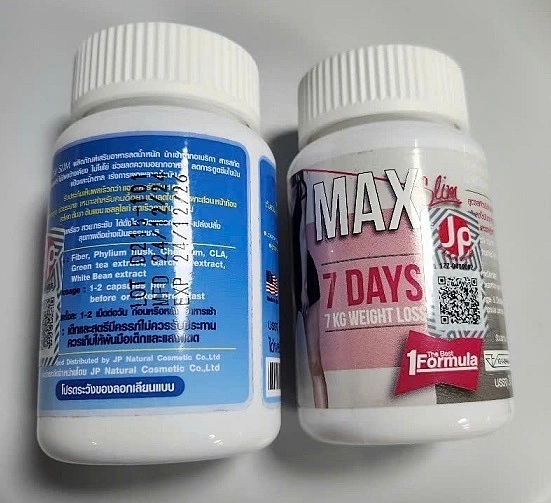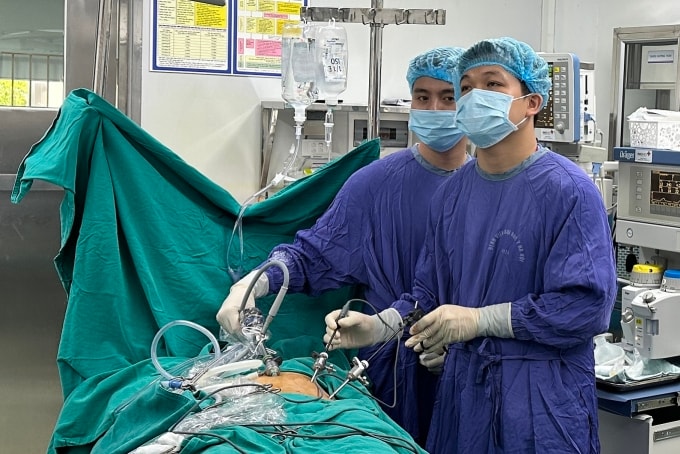Medicines and dietary supplements are increasingly being advertised in sophisticated ways on social media to manipulate consumers. Many people have fallen into the 'trap' of buying medicine online.

Ms. Lan bought a medicine advertised on TikTok that helps "gain 3-4 kg per month" for her daughter to take. A month later, the child had endocrine disorders.
Her 15-year-old daughter only weighs 32 kg, so Ms. Lan is very worried about her daughter gaining weight. After many days of research, the woman living in Dong Da district, Hanoi, spent nearly 1 million VND to buy "rapid growth hormone supplement" medicine.
The seller claimed to be a physician, promising that the product was "safe for children and had many positive reviews". However, after 1 month of use, her daughter did not gain weight but lost weight, was tired, had a stomachache, and went to the Institute of Nutrition for examination. The doctor diagnosed that the baby was underweight, malnourished, and had an endocrine disorder.
Also falling into the "trap" of buying medicine online, a 25-year-old girl suffered facial swelling and a red rash spreading to her hands after a few weeks of using melasma treatment medicine. Before that, she bought a fast-acting melasma treatment cream online, which the seller advertised as helping her skin become brighter, shinier and more beautiful.
After a few weeks of use, her skin began to itch, turn red, and become damaged on both her face and hands. She went to the Department of Dermatology - Cosmetic Dermatology, University of Medicine and Pharmacy Hospital, Ho Chi Minh City, where the doctor said her skin was melasma due to using products of unknown origin. He prescribed oral and topical medications to treat the melasma, but the improvement was only 50%.
A 21-year-old woman took a weight loss pill she bought on TikTok, was poisoned, and was rushed to the emergency room with severe brain damage. Test results at the hospital showed that the drug contained Sibutramine - a substance that was once used to treat obesity but has been banned due to the risk of poisoning, stroke, and cardiovascular disease.
The doctor checked and noted that the packaging of the weight loss pill had foreign words, no Vietnamese label, and was advertised in English with the content "7 days to lose 7 kg". The patient said that he had been taking the pill continuously for more than a month, one pill a day, and had lost 4 - 5 kg.
The Ministry of Health has repeatedly warned about the situation of advertising that exaggerates the effects, causing harm to consumers' health. Meanwhile, functional foods are widely advertised on social networks and e-commerce platforms, introduced by celebrities, TikTokers or KOLs, causing confusion and serious consequences for consumers. A typical recent example is the Kera vegetable candy product that has been advertised by many celebrities as an alternative to green vegetables. In fact, the product is only a food supplement, with no nutritional value to replace green vegetables.
Dr. Ngo Van Ty, Department of Oncology, Hanoi Medical University Hospital, said that drugs and functional foods are increasingly being "sophisticatedly advertised" on social networks to manipulate consumers. Many sellers impersonate doctors or medical experts to deceive patients. These products are often marketed as "miracles" but have not undergone research or clinical proof.
"Functional foods only have a supportive effect, cannot replace treatment drugs and no one can cure cancer, blood pressure or cardiovascular disease with just supplements," said Dr. Ty.
However, consumers still fall into traps due to lack of information or being easily lured by "instant noodle" advertisements. The Ministry of Health recommends that people should not trust "miraculous" advertisements, and at the same time requires agencies to tighten management of online product sales, especially products of unknown origin.
According to the draft amended law submitted to the National Assembly on June 17, 2024, online drug trading must be conducted on e-commerce trading floors or official sales websites, with product information strictly controlled. Sellers must commit to complying with regulations on advertising as well as customer information confidentiality.
The draft also proposes that drugs and pharmaceutical ingredients are not allowed to be traded on social networks such as Facebook or TikTok. This measure is aimed at limiting the abuse of inaccurate information and protecting consumer health.

The Food Safety Department recommends that people carefully check information about products before using them. Websites such as congkhaiyte.moh.gov.vn or nghidinh15.vfa.gov.vn are official addresses to look up information about health protection products.
Only buy products from reputable sources, with clear certification and labels. In case of illness, go to a medical facility for timely examination and treatment, avoid using drugs of unknown origin on your own, which can make the illness worse.
TB (according to VnExpress)